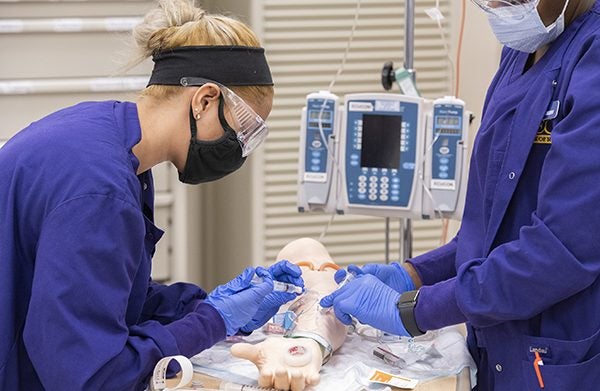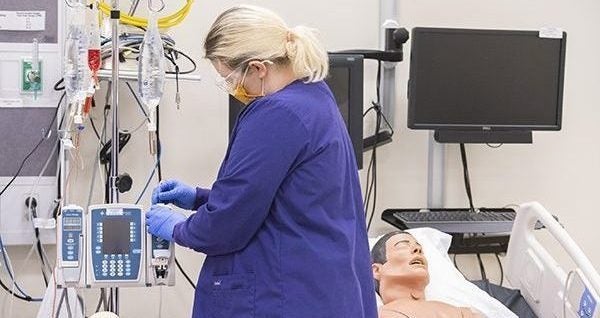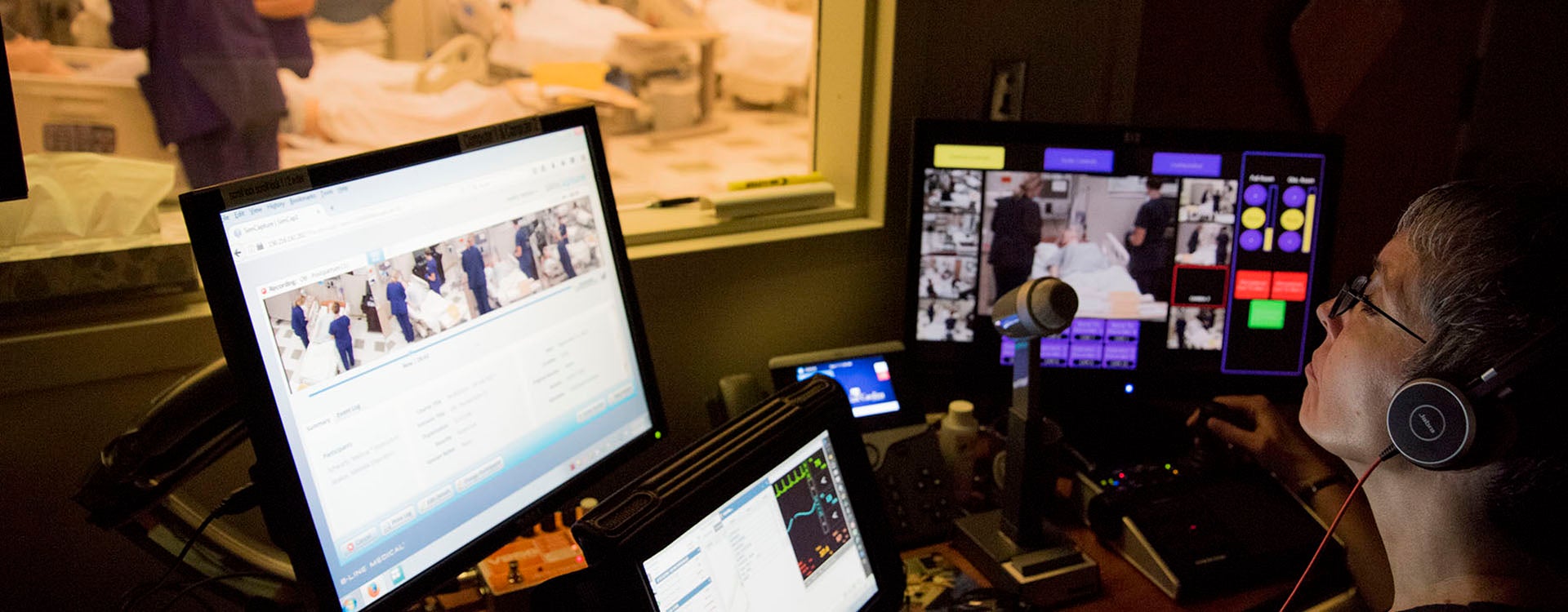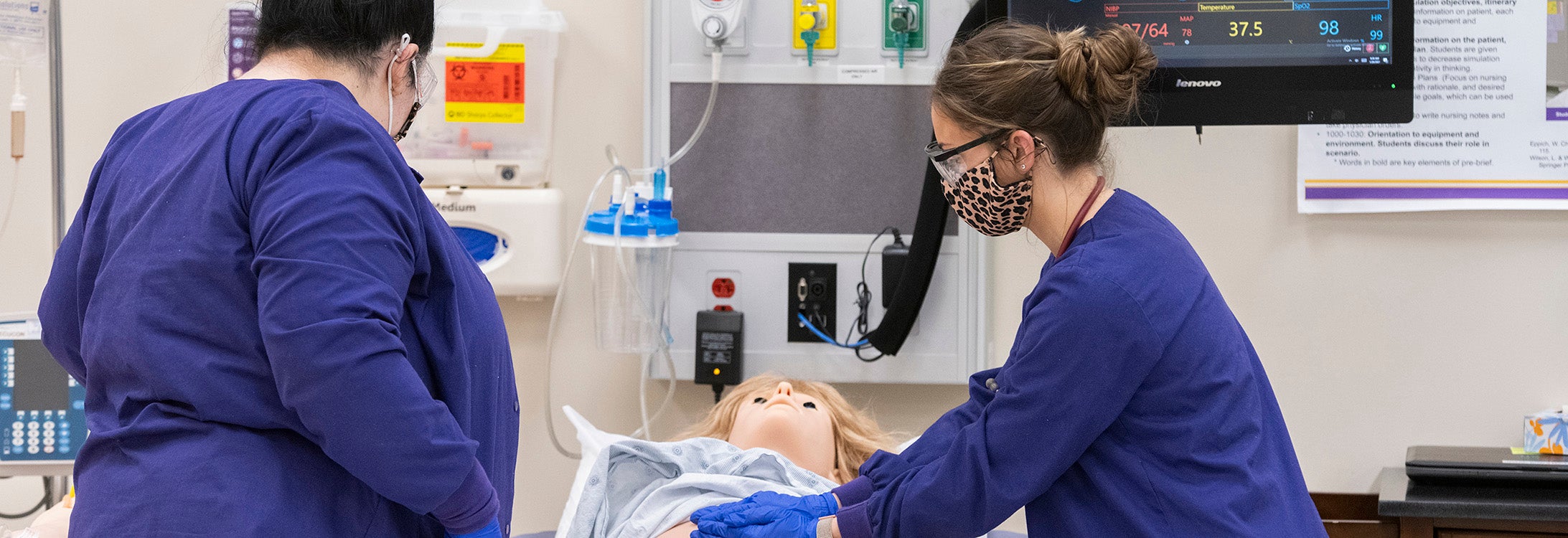SIMULATION ACCREDITATION
ECU becomes only public university in the state with a fully accredited nursing simulation program

The college’s virtual tour with accreditors included displaying workrooms, cabinets with supplies, equipment and practice medications for student use. (Photo by Jeremy Smith)
The Society for Simulation in Healthcare recently granted full accreditation to the East Carolina University College of Nursing’s simulation program, making ECU the only public university in the state with a fully accredited nursing simulation program.
The program’s accreditation — in the area of Teaching and Education — was officially announced as part of a virtual ceremony during the International Meeting on Simulation in Healthcare (IMSH) conference in January.
The college’s simulation spaces account for 7,700 square feet on the building’s second, third and fourth floors. The labs include three standard rooms used for skills, health assessment and procedural training; three general simulation rooms; one simulated operating room; and one anesthesia teaching lab. More than 55 simulation manikins test a variety of skills and are diverse in age, race and gender. Labs are equipped with mounted video cameras, and several of the rooms include an observation area that allows faculty and staff to view simulations so that students can be debriefed following each session.
Simulation experiences are an integral part of the curriculum in both undergraduate and graduate-level programs at the college. Students working in the labs learn through a variety of educational formats, including:
- Collaborative practice
- Independent study
- Role play
- Peer-to-peer, faculty, and staff demonstrations
“The college’s state-of-the-art Concepts Integration Labs give students realistic experiences in a safe environment that help them to build competence and confidence in providing patient care,” said Dr. Sylvia Brown, dean of the College of Nursing. “Full accreditation from the Society of Simulation in Healthcare is a direct result of our faculty and staff’s commitment to giving our students the best opportunities to succeed.”

More than 55 simulation manikins test a variety of skills and are diverse in age, race and gender. (Photo by Jeremy Smith)
To receive accreditation, the college’s Concepts Integration Laboratories had to demonstrate compliance with core standards and teaching/education standards set by the Society for Simulation in Healthcare (SSH). Along with the information required as part of the accreditation process, the college provided documentation of standard operating procedures and how labs are managed, the expertise of faculty and staff, and the simulation educational opportunities offered.
Because of the pandemic, the college also submitted a video tour of the labs including workrooms and cabinets with supplies, equipment and practice medications for student use. Faculty, staff and students also completed a virtual site visit with a review team.
The accreditation lasts five years with proof of maintenance and improvement. Prior to receiving full accreditation, the college received provisional accreditation lasting for two years.
“I am so excited to receive the full accreditation status,” said Melinda Walker, nurse supervisor and assistant director of the Concepts Integration Labs. “We have all worked so hard in obtaining this accomplishment, proving the lab faculty and staff are committed to providing excellence in the area of simulation for our nursing students and other areas of East Carolina University who use our labs. We will continue to provide the best for our students and always strive for excellence in our program.”
BY THE NUMBERS
7,700 square feet of advanced simulation lab space on the 2nd, 3rd and 4th floors of the College of Nursing.
140+ simulations run during the 2019-2020 academic year.
55+ simulation manikins that test a variety of skills and are diverse in age, race and gender.
8 simulation labs equipped with state-of-the-art medical and simulation tools, including compressed air to allow simulation of medical air, oxygen and suction, stand-up computer stations, as well as computers that operate video and sound recording and playback for debriefing in each lab space.
2-way mirrors divide labs and observation rooms that allow faculty and students to observe the simulation without distracting those participating.

Observation rooms separated from simulation labs by two-way mirrors allow faculty to manage and record simulations for later assessment with students. (Photo taken pre-COVID by Cliff Hollis)
